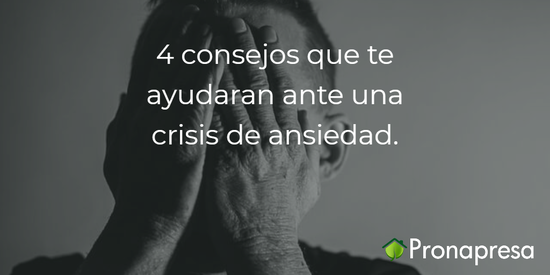
Intense, excessive, and ongoing worry and fear in everyday situations. This may include rapid heart rate, rapid breathing, sweating, and a feeling of fatigue.
Anxiety can be normal in stressful situations, such as public speaking or taking a test. Anxiety is only an indicator of an underlying illness when feelings become excessive, constantly, and interfere with daily life.
Anxiety attacks, which are more common in women, usually appear after the age of 24. They are often related to psychosocial factors but also to a genetic tendency or vulnerability. Always remember to see a specialist.
[product=cbd-oil-broad-spectrum-ihf-1000-mg]
Experience the power of broad-spectrum CBD against stress and anxiety!
[/product]
The anxiety crisis.
An anxiety attack is a sudden onset of panic. Its symptoms may include the following, although they vary from person to person:
- Palpitations.
- Sweating.
- Shaking.
- Dry mouth.
- Difficulty breathing and feeling of suffocation.
- Chest pain.
- Nausea and abdominal discomfort.
- Feeling of unreality.
- Paresthesia (A tingling or pricking sensation, usually temporary, that usually occurs in the arms, hands, legs, or feet.)
In the face of this type of crisis, the best thing to do is seek appropriate help that will allow us to relax and maintain good mental health.
Why do crises occur?
- The cause of these attacks can't always be pinpointed, so they're unpredictable. However, some people do learn to identify the situations that lead to these attacks so they can avoid them.
Treatment of anxiety attacks.
Studies show the difficulties in treating anxiety attacks for different reasons:
- The affected person does not ask for professional help.
- Guidelines for treating crises with psychological support and medication, on an outpatient basis, are unclear or not followed.
However, the affected person should receive a psychological diagnosis of their disorder, its possible causes, and available treatments. Psychotherapy, medications, and other possible courses of action should be assessed after a personalized analysis.
The patient's age, prior treatment history, suicide risk, and the severity of anxiety attacks, among many other factors, should always be taken into account. Therefore, a thorough assessment will be required.
Medical causes.
For some people, anxiety may be related to a hidden health problem. In some cases, the signs and symptoms of anxiety are the first indicators of an illness. If your doctor suspects that your anxiety may have a medical cause, they may order tests to look for signs of the problem.
Some examples of medical problems that may be related to anxiety include the following:
- Heart disease.
- Diabetes.
- Thyroid problems, such as hyperthyroidism.
- Respiratory disorders, such as chronic obstructive pulmonary disease (COPD) or asthma.
- Substance misuse or withdrawal.
- Withdrawal from alcohol, anti-anxiety medications (benzodiazepines), or other medications.
- Chronic pain or irritable bowel syndrome.
- Rare tumors that produce “fight or flight” response hormones.
- Anxiety can sometimes be a side effect of some medications.
General tips to help with anxiety attacks.
1. Lavender oil
- There are some natural remedies that can help us prevent or calm the symptoms of anxiety attacks.
- Lavender oil has been shown to be effective in relaxing people with disorders affecting the nervous system. We can apply it to our forehead or inhale it.
2. Physical exercise and relaxation
- Through physical exercise or relaxation, we can help control seizures and promote well-being.
- Physical exercise is not the solution to anxiety attacks. However, studies show that it can help in conjunction with other measures. For example, doing aerobic exercise three times a week.
- Likewise, muscle relaxation methods should also be explored. This will depend on the patient's tastes and personality, and they can try activities such as yoga or any other activity of their choice.
3. Breathing
- As we've mentioned, difficulty breathing is one of the symptoms of an anxiety attack. Hyperventilation, for example, could even initiate or maintain the attack. For the same reason, learning to control breathing could be important during the attack and as a treatment.
- Breathing retraining could reduce the frequency and intensity of anxiety attacks. Therefore, any therapy aimed at this goal could be beneficial.
4. Psychotherapy
- Psychotherapy has proven to be effective in treating anxiety attacks and stress in the long term.
- Beyond the moment of anxiety attacks, psychotherapy should be the long-term treatment to permanently overcome them. Patients can also attend support talks and self-help groups if they wish.
- The psychotherapist will be responsible for investigating the emotional problems associated with this disorder. The causes and how anxiety manifests in physical conditions will also be evaluated.
- Among the different options, Cognitive Behavioral Therapy (CBT) stands out, having proven effective in this condition. CBT teaches patients different ways of thinking, behaving, and reacting to their own feelings, which lead to crises.























































